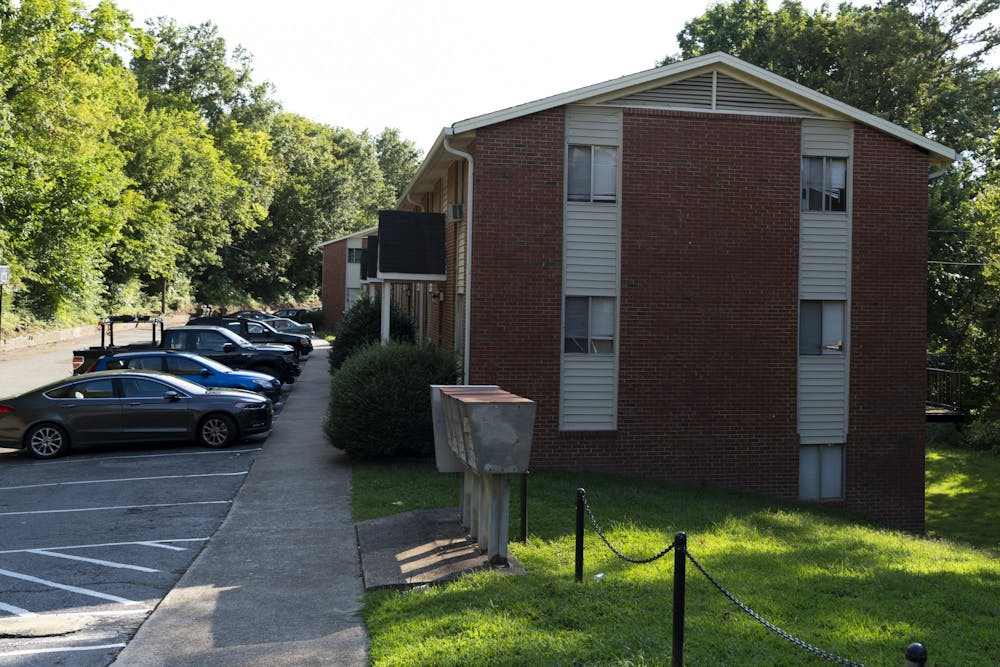In the couple’s previous apartment, a Durham townhome, they paid $875 per month for rent, a rate which only increased by $50 over three years.
They left because the owner was selling the property to flip on the market.
University Gardens was the cheapest place they could find that had enough space for children, and even the rent there was $300 more expensive than that at their former residence.
They now live in a Carrboro apartment, and the rent is even higher. It was the only location they could afford to even apply to live in — rental application fees are now as high as $250.
“It wasn’t really so much of like, what can we afford, it was like what do we have to pay?” Storey said.
According to Sarah Viñas, the director of affordable housing and community connections for the Town of Chapel Hill, housing costs ballooned during the pandemic. She said that the town’s average rent has risen by 35 percent over the past five years and home values by 69 percent.
“There’s very few options for people,” she said.
According to Viñas, the housing crisis has also affected people who already own their homes. As property taxes rise, residents with a low or fixed income, including many Black homeowners, have struggled to keep up.
Additionally, redevelopment has threatened Hispanic communities living in manufactured homes in north Chapel Hill. Viñas said that while these residents may own their homes, the people living there become vulnerable to displacement if the lots are sold.
“It’s very sought-after real estate,” she said.
To get the day's news and headlines in your inbox each morning, sign up for our email newsletters.
Community response
The Town of Chapel Hill has allocated $9.1 million toward affordable housing this year.
“That’s more than the Town has ever made available at one time to support projects, so we’re really excited about that,” Viñas said.
That money will help build over 300 units, many for those earning less than 30 percent of the area's median income.
In addition to various housing subsidies and support programs like the Employee Housing Program, the Town also approved two Town-initiated housing projects on Jay Street and Trinity Court. With funding from a low-income housing tax credit, these initiatives will provide over 100 additional affordable housing units.
The Town has set a goal of adding 500 units of housing of all types per year to slow the price increase from the supply side, Viñas said.
To that end, the housing development approval process has also been shortened.
“Any project that will include 25 percent or more affordable housing in the project will move through our development process in six months,” she said.
According to Carrboro Town Council member Barbara Foushee, the Town of Carrboro has also put forward over $1 million in ARPA funds to affordable housing projects, including a donation towards the Perry Place development.
The project on Merritt Mill Road is a collaborative effort between Chapel Hill, Carrboro, Orange County and CASA, a Triangle-based affordable housing advocacy group. Construction is expected to be done by 2023 and provide 48 units at $350 to $950 per month.
Foushee said she plans to advocate for more funding for affordable housing in Carrboro’s next budget.
“Every budget season it is a discussion about adding more money, but then you also have to consider we have a high property tax rate already,” she said.
Non-renewable ARPA funds were also a substantial part of Chapel Hill’s $9.1 million commitment, Viñas said, and federal funding specifically for affordable housing has dried up.
“We do anticipate a very substantial gap in terms of funding need over the next several years,” she said.
State laws, like the ban on rent control, also pose a challenge to reigning in housing prices at the town level.
Construction of new affordable housing remains one of local governments’ most effective tools to control prices.
“That’s not gonna solve our problem, but it’s certainly gonna help with some of the issues that we’re seeing around affordability,” Viñas said.
@gacmorrison
@DTHCityState | city@dailytarheel.com




